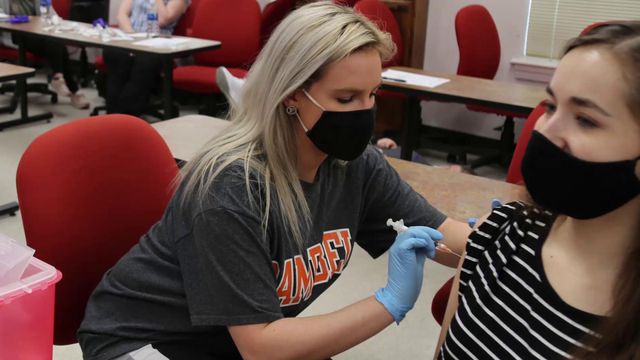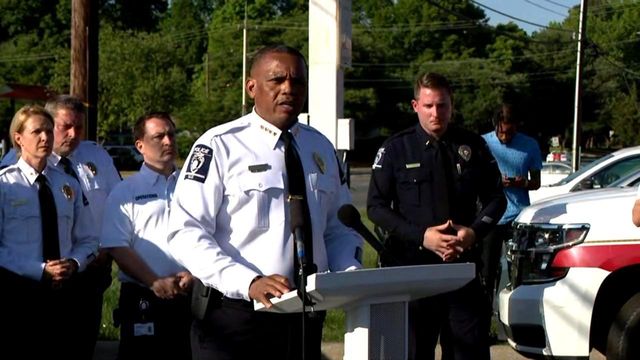Campbell University's mobile units bring education and healthcare to rural communities
This article was written for our sponsor, Campbell University School of Osteopathic Medicine.
For rural Americans, consistent access to quality healthcare is an increasing area of need. Not only are there typically fewer hospital and clinic locations, but to reach a facility with specialized equipment, patients may need to travel long distances — taking off work, hiring child care and finding a reliable vehicle all to make it there.
At Campbell University School of Osteopathic Medicine, three Mobile Health and Education Clinics are slated to bring much-needed quality healthcare to rural and underserved individuals in southeastern North Carolina.
"We had a great opportunity to address and respond to the COVID 19 outbreak, so we shifted our vision to more comprehensively address immediate healthcare concerns for rural and underserved populations, and to also be able to do educational outreach," said Robert J. Schmid, an assistant professor and technical director of the Simulation Center at Campbell University School of Osteopathic Medicine. "We'll have some mobile testing equipment to do quick tests, we'll be able to gather labs for testing, and we're going to have built-in Wifi. This will allow us to create electronic medical records for all our patients so that they start having some continuity of care. Our vision was to respond to the short-term need, but also create a long-term plan that has ongoing care for this underserved community."
In total, the university will have three mobile health clinics. Two of the units will be 40 feet long and have two exam rooms, with a reception area in the middle for processes like labs and blood drawings. The other unit will be a little more than 26 feet long with one exam room and will allow access to more rural spaces that are typically challenging to reach.
The units will also be equipped to deliver medical training opportunities for resident physicians at Campbell's regional sites, preventing them from having to travel to another location to complete coursework and special procedure training. In doing so, Campbell will be continuing to fulfill its mission to increase the medical workforce of these communities.
Schmid hopes the mobile units will not only bring healthcare in and of itself to these communities, but also create a regular repertoire between patients and health professionals they wouldn't otherwise have.
"The larger medical centers do incredible things. But for the mobile units, the strengths are for basic primary care and helping people manage chronic diseases like diabetes and asthma. We can provide regular tests, as well as offer patients the chance to address their health concerns with doctors and other healthcare practitioners," said Schmid. "If we can change people's habits now, we can really help improve the health of the larger community — especially for these folks who don't have access or money for these services."
In addition to providing important healthcare and education to rural communities, the mobile units also provide hands-on training for Campbell students. Typically, students' exposure to clinical experience is limited until they begin rotating in hospitals. Through the mobile units, the school hopes to give them early training to particularly address healthcare needs in rural communities.
"The mobile clinics offer students early clinical experiences, whether they're medical students, pharmacy students, physician assistant students, nursing students and so on. They'll be interacting with patients, understanding concerns, and learning how to relate to those. There is a range of communication and interpersonal skills that we are responsible for developing, and this helps foster those skills in advance of when they otherwise might be taught," said Schmid. "Students are integrating skills and becoming better practitioners, because that's where the art of medicine shows out — patients trust their doctor enough to share everything that's going on, and the doctor is skilled enough to be receptive to hearing it and making space for patients to be heard."
"In doing this, our goal is to create primary care doctors who want to serve in smaller communities and can make huge impacts in people's lives."
While the first year of the mobile units will largely revolve around providing COVID vaccinations and education on the vaccines available, Schmid would like to see the units eventually shift to focusing on consistent primary care and health education.
In the immediate future, the units will be visiting communities across the Piedmont and Eastern North Carolina area, including the Lumbee nation. As they continue to develop the details of the program, they hope the connections formed with community groups and organizations will help them extend the reach and frequency of the units' visits.
"Part of Campbell's core mission for the medical school is to serve rural and underserved communities," said Schmid. "This is an incredible opportunity and method for connecting to folks in rural and underserved areas, and leverage community assets by making ourselves present at their door."
This project was supported by the NC HB 1043 COVID-19 Response through Campbell University, Inc. and the Campbell University School of Osteopathic Medicine Grant Agreement 25-00
This article was written for our sponsor, Campbell University School of Osteopathic Medicine.











